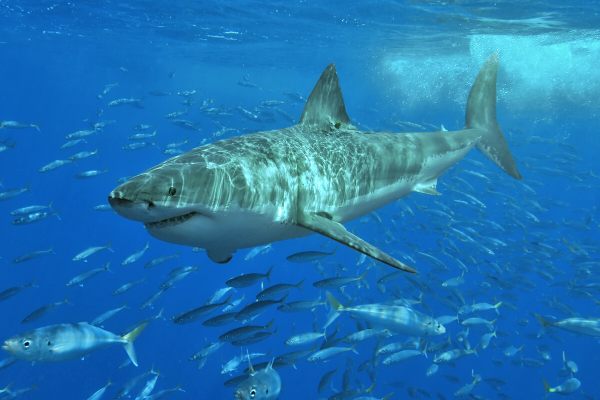A Guide to the Great White Sharks North Carolina

North Carolina’s Great White Sharks
Did you know that there are great white sharks North Carolina? Though they are not as common as in other parts of the world, these massive predators do call the Tar Heel State home. In this blog post, we’ll take a look at what attracts great white sharks to North Carolina, where they are most likely to be found, and what you should do if you find yourself in the presence of one of these awesome animals.
What Attracts Great White Sharks to North Carolina?
There are a few factors that make North Carolina an attractive destination for great white sharks. The first is the presence of large prey animals. Great white sharks primarily eat fish, and North Carolina is home to a variety of large fish species that make for a tasty meal. The second factor is the warm water temperatures. Great white sharks are cold-blooded animals, so they prefer to stay in waters that are around 70 degrees Fahrenheit. North Carolina’s coastal waters typically fall within this range, making it a comfortable environment for these sharks.
Where Are Great White Sharks Most Likely to Be Found in North Carolina?
Great white sharks are typically found in waters that are close to the shore. In North Carolina, the areas where they are most commonly seen are along the Outer Banks and in the Cape Fear region. These areas have the perfect combination of large prey animals and warm water temperatures that great white sharks are looking for.
What Should You Do if You Find Yourself in the Presence of a Great White Shark?
If you find yourself in the presence of a great white shark, the best thing to do is to stay calm and avoid making any sudden movements. These sharks are curious by nature, so they may approach you out of curiosity. However, they are also easily startled, so it’s important not to do anything that could make them feel threatened. If the shark does begin to act aggressively, you should use whatever you have on hand to defend yourself, such as a boat paddle or a fishing spear.
Great white sharks are truly amazing animals, and North Carolina is lucky to have them in our waters. If you ever have the chance to see one of these sharks in person, it’s an experience you’ll
The Great White Shark’s North Carolina Connection
The great white sharks of North Carolina have been a source of fascination for centuries. These massive predators have been known to attack and kill humans, which has led to their reputation as one of the most dangerous animals in the world. However, great white sharks are also an important part of the ecosystem and play a vital role in the food chain. In recent years, there has been an increase in the number of great white sharks seen off the coast of North Carolina, which has led to a greater understanding of these amazing creatures.
The great white shark is the largest known predatory fish in the world. Adult great white sharks can grow to be 20 feet long and weigh over 5,000 pounds. These massive predators are found in all major oceans around the world, but they are most commonly found in the coastal waters of the United States, Australia, and South Africa. Great white sharks are apex predators, which means they are at the top of the food chain. These sharks primarily feed on marine mammals such as seals, dolphins, and whales.
Great white sharks have been a source of fear and fascination for centuries. These sharks were first brought to public attention in the early 19th century after a series of attacks on humans. In 1876, a great white shark attacked and killed a swimmer off the coast of New Jersey. This event sparked a wave of panic and led to a widespread belief that great white sharks were man-eating monsters. This belief was further cemented by the release of the movie Jaws in 1975, which portrayed great white sharks as ruthless killers.
Despite their fearsome reputation, great white sharks are not actually a threat to humans. In fact, there have been very few documented cases of great white sharks attacking and killing humans. Most attacks on humans are actually cases of mistaken identity, where the shark mistakes a human for a seal or other marine mammal. When great white sharks do attack humans, it is usually out of curiosity or hunger, and not out of malice.
The great white sharks of North Carolina have been the subject of much study in recent years. In 2016, a study was conducted that tracked the movements of great white sharks off the coast of North Carolina. This study found that great white
North Carolina’s Great White Shark Population
North Carolina’s Great White Shark Population
Though they are feared by many, great white sharks are actually quite shy and elusive creatures. These massive predators are actually quite rare, and are only found in certain areas of the world. North Carolina is home to a small but thriving population of great white sharks, and these incredible animals can be found off the coast of the Outer Banks.
There are a number of reasons why North Carolina is such a great place for great white sharks. The warm waters off the coast provide an ideal habitat for these sharks, and there is an abundance of food for them to eat. Great white sharks are known to feed on a variety of marine life, including seals, fish, and even other sharks.
The great white shark population in North Carolina is thought to be around 100 individuals. While this may seem like a small number, it is actually quite significant. North Carolina is one of the only places in the world where great white sharks can be found in such large numbers.
If you’re interested in seeing a great white shark in North Carolina, the best time to do so is from May to November. This is when the great white sharks are most active in the waters off the Outer Banks. There are a number of tour companies that offer trips out to see these amazing creatures, and it is an experience you will never forget.
The Great White Shark’s North Carolina Habitat
Although great white sharks are found in all the world’s oceans, they seem to prefer temperate waters. In the North Atlantic, great whites are found off the coasts of Newfoundland, New England and New Jersey in the United States, as well as in the Mediterranean Sea. In the North Pacific, they are found off the coasts of California, Oregon, Washington, British Columbia and Alaska in the United States, and off the coast of Japan.
There are a few potential reasons why great white sharks prefer these waters. One reason may be that these are the areas where their preferred prey is found. Great white sharks primarily eat marine mammals, such as seals, sea lions, dolphins and whales. These animals are more common in temperate waters than in tropical waters.
Another reason great white sharks may prefer temperate waters is that these are the areas where they mate and give birth. Great white sharks reach sexual maturity at around 15 years of age. Females give birth to live young, and they give birth every two to three years. The gestation period is about 12 months.
Pups are born in the spring and summer months, and they are born in warm, shallow waters. After giving birth, female great white sharks head back to cooler waters. It is thought that they do this to avoid competition from other sharks for food.
Although great white sharks are found in all the world’s oceans, they seem to prefer temperate waters like those off the coast of North Carolina. This may be because these are the areas where their preferred prey is found. Great white sharks primarily eat marine mammals, such as seals, sea lions, dolphins and whales. These animals are more common in temperate waters than in tropical waters.
Another reason great white sharks may prefer temperate waters is that these are the areas where they mate and give birth. Great white sharks reach sexual maturity at around 15 years of age. Females give birth to live young, and they give birth every two to three years. The gestation period is about 12 months.
Pups are born in the spring and summer months, and they are born in warm, shallow waters. After giving birth, female
North Carolina’s Great White Shark Hunting Grounds
If you’re looking for an adrenaline-pumping vacation, consider heading to North Carolina to go hunting for great white sharks. There are several hotspots along the North Carolina coast where these massive predators can be found. Here are five of the best places to go shark hunting in North Carolina:
1. Cape Hatteras National Seashore
Cape Hatteras is one of the most popular spots for shark hunting in North Carolina. The waters here are teeming with prey, which attracts great whites from all over the Atlantic. There are several charter companies that offer shark hunting trips in this area.
2. Ocracoke Island
Ocracoke Island is another great place to hunt for great whites. The island is located at the southern end of the Outer Banks, and the waters around it are known for being particularly shark-rich. There are several charter companies that offer shark hunting trips in this area.
3. Beaufort
Beaufort is a small town located on the coast of North Carolina. It’s a popular spot for shark hunting, as the waters here are known to be full of great whites. There are several charter companies that offer shark hunting trips in this area.
4. Wilmington
Wilmington is a coastal city located in southeastern North Carolina. It’s a popular spot for shark hunting, as the waters here are known to be full of great whites. There are several charter companies that offer shark hunting trips in this area.
5. Morehead City
Morehead City is a coastal city located in central North Carolina. It’s a popular spot for shark hunting, as the waters here are known to be full of great whites. There are several charter companies that offer shark hunting trips in this area.
The Great White Shark’s North Carolina Victims
There have been a total of six great white shark attacks in North Carolina since the state began keeping records in 1935. Of those six attacks, five have been fatal. The most recent attack occurred in 2016, when a young boy was killed while swimming off the coast of Brunswick County.
The great white shark is the largest predatory fish in the world and can grow to lengths of over 20 feet (6 meters). These massive creatures are found in all major oceans and are known to frequent coastal areas where there is an abundance of food.
While great white sharks are not typically aggressive towards humans, they have been known to attack people when they feel threatened. In most cases, great white shark attacks are not fatal, but they can cause serious injuries.
If you are planning on swimming in North Carolina waters, it is important to be aware of the potential danger posed by great white sharks. There are a few simple steps you can take to decrease your chances of being attacked:
– Avoid swimming near areas where there is a lot of fish activity, as this is where sharks are most likely to be feeding.
– Stay in groups when swimming, as sharks are more likely to attack individuals.
– Do not swim at dawn or dusk, as this is when sharks are most active.
– If you see a shark, do not panic. Try to slowly move away from the animal and avoid making any sudden movements.
North Carolina’s Great White Shark Research
North Carolina is one of the best places in the world to study great white sharks. There are a number of reasons for this, including the fact that the state has a large number of coastline, which makes it easier for researchers to track the movements of these massive predators. Additionally, North Carolina is home to a number of popular beaches, which attract great white sharks in search of food.
In recent years, North Carolina has become a hot spot for great white shark research. A number of different organizations and institutions are now conducting studies on these animals in an effort to better understand their behavior and ecology. Some of the most notable great white shark research projects in North Carolina include:
The Ocearch Shark Tracking Project
The Ocearch Shark Tracking Project is a collaborative research effort that uses satellite tags to track the movements of great white sharks around the world. Since 2012, the project has tagged and tracked more than 50 great white sharks off the coast of North Carolina. The data collected by the project has helped researchers to better understand the migratory patterns of these animals and has even led to the discovery of a new great white shark nursery area off the coast of Cape Hatteras.
The North Carolina Division of Marine Fisheries Shark Tagging Program
The North Carolina Division of Marine Fisheries Shark Tagging Program is one of the longest running shark research programs in the world. Since 1984, the program has tagged and released more than 1,500 sharks, including more than 100 great white sharks. The data collected by the program has helped to improve our understanding of the movements and behavior of these animals.
The NC State University Shark Research Program
The NC State University Shark Research Program is a multi-disciplinary effort that is focused on understanding the ecology and behavior of great white sharks. The program has been conducting research off the coast of North Carolina since 2009 and has tagged and tracked more than 30 great white sharks. The data collected by the program is being used to develop models that can be used to predict the movements of these animals and to assess the risk of shark attacks.
The Great White Shark’s North Carolina Future
The great white shark is one of the most feared predators in the ocean. But despite their reputation, these massive sharks are actually quite rare. In fact, there have only been a handful of confirmed sightings of great white sharks off the coast of North Carolina in the past few years.
Despite their rarity, great white sharks are still a potential threat to swimmers and surfers in North Carolina. That’s why it’s important to be aware of their presence in the waters off our coast. Here’s what you need to know about great white sharks in North Carolina:
There have been a handful of great white shark sightings off the coast of North Carolina in recent years, but the number of confirmed sightings is relatively low. In 2019, there were only two confirmed sightings of great white sharks in North Carolina waters.
Great white sharks are a potential threat to swimmers and surfers in North Carolina. However, there have been no reported attacks on humans by great white sharks in North Carolina waters.
Great white sharks are protected under the federal Endangered Species Act. It is illegal to hunt or kill a great white shark in North Carolina waters.
If you see a great white shark in North Carolina waters, you should report it to the NC Division of Marine Fisheries.
The great white shark is an impressive and intimidating predator. But despite their reputation, these massive sharks are actually quite rare. In fact, there have only been a handful of confirmed sightings of great white sharks off the coast of North Carolina in the past few years.
Despite their rarity, great white sharks are still a potential threat to swimmers and surfers in North Carolina. That’s why it’s important to be aware of their presence in the waters off our coast. Here’s what you need to know about great white sharks in North Carolina.




